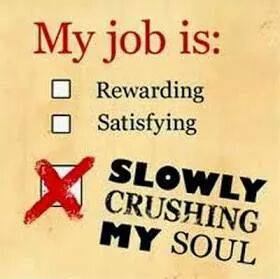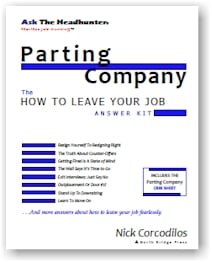In the July 3, 2018 Ask The Headhunter Newsletter a reader’s new job offer is rescinded after he quits his old job. Does he have legal recourse?
Question
I was given an official job offer. The letter stated that if I met the conditions of the job offer (and it listed the conditions) that the offer would be finalized.
I completed the conditions and the local hiring manager scheduled my start date. I put in two weeks’ notice at my old job. Two days before my start date, they revoked my offer, stating that I was not “rehireable.” (I worked for a company owned by this company almost 10 years ago, but I disclosed that on my application.)
They said that the company is an “at will” employer so they didn’t have to honor anything stated in the job-offer letter. Do I have any legal recourse? I have no job at all now. Thank you.
Nick’s Reply
I’m very sorry to hear this. Such stories about rescinded (or revoked) job offers are too common nowadays. We’ve discussed this problem before, but it’s such a tragic trend that we need to keep talking about it.
You should seek counsel from a good lawyer that specializes in employment law. However, I’ll give you my thoughts with the proviso that this is of course not legal advice.
If you work in an “at-will” state, the employer may be able to fire you for any reason or no reason at any time. What that implies — though you should check with a lawyer about your specific case — is that they could complete the hire and fire you the same day. So you see the problem.
Now let’s go back to what you stated: You were given a official conditional job offer. While I give you credit for making sure you had the offer in writing, the word “conditional” is key. That left the door open for them to not make the hire after all. Here’s where it may get complicated legally, and why you may need a lawyer.
Did you meet the conditions?
You believe you met all the conditions to lift the contingency, but apparently they don’t agree — or they don’t care. What you should have done before quitting your old job was to get a written confirmation from the new employer that you had in fact met the conditions. This could be very helpful if you litigate the matter.
Of course, in an at-will state this may be a moot point. But it’s up to you to take all reasonable precautions to protect yourself.
Did the hiring manager’s actions suggest you met the conditions?
The hiring manager scheduled your start date, which seems to imply he agrees you met the necessary conditions. A good lawyer might be able to do something with that.
Did the employer know you were going to quit another job?
Additionally, there’s the matter of whether you will now suffer because the promise of a job was broken — and whether that hiring manager knew you would be hurt by his action because his offer prompted you to quit another job. Retired employment attorney Lawrence Barty explains it like this:
“A person who reasonably acts in reliance upon a promise and then suffers detrimentally because the promise is broken has a cause of action called Promissory Estoppel. The Promiser is ‘estopped’ from rescinding the promise if the Promiser knew or had reason to know that the Promisee would rely upon the promise to the Promisee’s detriment.”
That is, if you informed the new employer that you were going to quit your old job and lose your income because you were relying on their job offer, then an attorney may be able to make a case for you. Barty goes on to say:
“The Promisee in such a case, once the proof has been accepted, is entitled to be made whole. For example, if A quits his job and then is left without work for a period until he finds comparable employment, A is entitled to Reliance Damages in an amount equal to the lost wages and benefits.”
Rescinded offers are reprehensible
Too often, job seekers are so thrilled at a new job offer that they make assumptions and move too quickly. That’s understandable. But when the potential consequences of making a mistake are huge — and losing your income is a huge risk — then it’s time to slow down and be extra careful about actions you take, like quitting your old job. (This is such an important topic that I wrote a whole book about it. Here’s an article that discusses some of the main ideas: Parting Company: How to leave your job.)
The critical tip-off in your story is in your first sentence: The offer was conditional. But please don’t misunderstand my position on this. While you bear some responsibility, employers who rescind offers so cavalierly are irresponsible. The tip-off about this employer was in what they said to you: “They said… they didn’t have to honor anything stated in the job-offer letter.” While the company’s lawyers might be able to argue it did nothing illegal, its behavior is unacceptable and reprehensible.
While the doctrine caveat emptor certainly holds here, a good employer nonetheless owes a job applicant a big, loud caution about not quitting their old job until a new job is certain. Did you owe yourself a more cautious attitude until it was all finalized? Based on what you’ve shared, I think you acted prudently. My advice to others: Don’t rush into a big decision (like quitting your job) without carefully assessing the risks.
Get legal advice
As you can see, it’s complicated and that’s why a qualified attorney is your best bet. I’m sure you’d rather not spend money on a lawyer, but I think the price of an initial consultation is well worth it since we’re talking about the loss of your salary. I’d talk to a lawyer immediately. Even if this does not turn into a court case, a stern nastygram from a potent lawyer could result in a cash settlement from the employer.
A word to HR managers
Rescinding a job offer is a really lousy thing to do, and explaining it away by citing your freedom to fire “at will” is cheesy. If your integrity and your company’s reputation matter to you, please read the section “Stop rescinding offers” in the article HR Managers: Do your job, or get out. If you work in HR, we’d love to hear your side of this problem.
Have you ever had a job offer rescinded? Did you quit your old job for a new job, only to wind up on the street? What did you do about it? How would you advise this reader?
: :


 Would you ever advise quitting a job before having another one lined up? I have completely lost faith my employer and job and I fear getting fired or worsening what’s left of my relationships here. I’d like to quit now. Is that a bad idea? Thanks.
Would you ever advise quitting a job before having another one lined up? I have completely lost faith my employer and job and I fear getting fired or worsening what’s left of my relationships here. I’d like to quit now. Is that a bad idea? Thanks. Unemployment bias and misery
Unemployment bias and misery I have a new job, so I gave my two weeks’ notice to my employer. But my boss let me go the same day! He said, “I accept your resignation. And you’re gone immediately.”
I have a new job, so I gave my two weeks’ notice to my employer. But my boss let me go the same day! He said, “I accept your resignation. And you’re gone immediately.” Question
Question Who’s really bad in today’s HR Technology world?
Who’s really bad in today’s HR Technology world? “When Joberate technology tells the recruiter that a person’s J-Score went up, it means that person’s job seeking behavior has increased, alerting the recruiter when it becomes the ideal time to contact a potential candidate. At that point a recruiter can send an InMail to a prospective candidate whose job seeking behavior and activities have just increased.”
“When Joberate technology tells the recruiter that a person’s J-Score went up, it means that person’s job seeking behavior has increased, alerting the recruiter when it becomes the ideal time to contact a potential candidate. At that point a recruiter can send an InMail to a prospective candidate whose job seeking behavior and activities have just increased.”

 If I get this job — and even with help it’s still a big IF, — it will be my last job. The salary and perks will get me through my last 20 years before retirement, and a few years in, I can even move anywhere I like in the world and work remotely. Sweet.
If I get this job — and even with help it’s still a big IF, — it will be my last job. The salary and perks will get me through my last 20 years before retirement, and a few years in, I can even move anywhere I like in the world and work remotely. Sweet.


